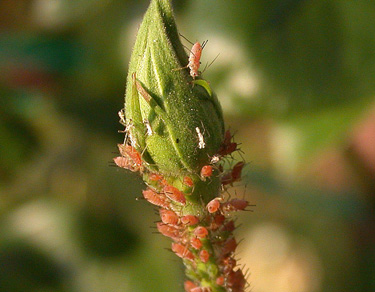Up close with aphids
If you grow vegetables, roses, dahlias, citrus, or other fruit trees you will have aphids in your garden. As soon as the weather warms and your plants flush into succulent spring growth, aphids are ready. They emerge from their winter slumber to start feeding and breeding like crazy.
These tiny sucking machines pierce young buds and shoots with their drinking straws and settle in for the feast, gorging themselves as they shoot out baby after baby.
Aphids multiply VERY rapidly in spring, not least because a female aphid has no time for love at this time of year. She makes babies without mating (it’s called parthenogenesis). What’s more, these babies are all girls and at just a week old start giving birth to their own baby girls - up to five per day for up to 30 days.
As if that wasn’t enough, unlike other insects, aphids don’t mess about laying eggs at this time of year. Spring babies are born live, so they can get sucking right away!
There are all many types of aphid, varying in colour from green to yellow and black, a different one for each kind of plant. All are soft bodied bugs 2-4mm long. You’ll see their fat little bodies clustered together as they suck the life out of your plants and poop out their ‘honey dew’.
Aphid infested buds may fail to open while leaves become twisted and distorted and growth may be stunted. One of the worst things about aphids is that they can transmit virus diseases to plants. The honeydew poop is also a problem, especially on citrus trees, as it attracts ugly black sooty mould. Ants will ‘farm’ the aphids for their honeydew, fending off aphid enemies so the aphids can keep feeding.
What to do about aphids
The first line of defence is to be on watch in early spring. Check your plants regularly at the beginning of warm weather so that aphids can be controlled before population explosion gets away on you.
Though frighteningly prolific, aphids are also quite vulnerable, easily squashed or killed with soapy water or other low toxicity sprays. They also have some very effective natural predators, including ladybirds and tiny parasitic wasps, so its important to look after these beneficials.
12-Oct-2016

rose aphids


